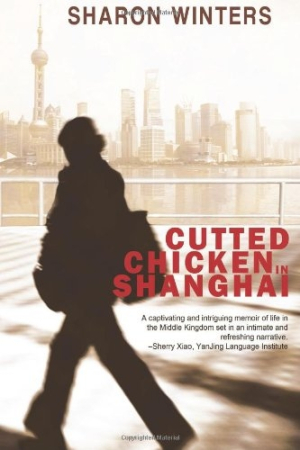Cutted Chicken in Shanghai
While playful and witty, this narrator allows us to be rooted in the rich soil of Chinese history and culture.
Sharon Winters’s Cutted Chicken in Shanghai is a delightful and dryly humorous marriage of memoir and travelogue with cultural and linguistic study. Winters’s husband is transferred by his company to work in Shanghai for two years. Winters, a practicing Buddhist, goes with him and documents her exploration of the cultural and linguistic curiosities of life and language as an American in China.
Winters spends her days studying Mandarin and shopping, often as a connoisseur of Chinese art and artifacts. Her relationship with her company-assigned driver, Jin, is the unifying element to all her adventures, and her documentation of her budding friendships with Jin and other natives is warmly humorous. The story line holds interest particularly because of the quick pace of the author’s titled and well-crafted journal entries, which often read like flash essays.
A simple and unapologetic writing style adds to the comedic effect of describing the unusual situations Winters encounters: “Chinese people frequently ask me how much I have paid for something. I find this annoying.” Her writing also imitates the more formal, less wordy Mandarin (she translates conversations into English for the reader), which will help readers enter more fully into the habits of Chinese-language conversations, such as referring to oneself in the third person and practicing the art of receiving hospitality under the guise of refusal.
Winters’s matter-of-fact tone is engaging and self-aware, even while she reports the difficulty of her new situation: “I want to rest and curl up with my book … [that] is written in English, thank you very much. Adjusting to life in Shanghai is a daily effort, and sometimes I don’t feel like making the effort, so I don’t. I stay home, do what I want, and I don’t study Chinese.” Her dry observations about things expats might find odd are more the stuff of curiosity rather than judgment, making her a more likable narrator: “I no longer say how much I have paid for something because Chinese people always say, ‘Whaaaaaa! You pay too much.’”
Without being its main aim, Cutted Chicken in Shanghai may also prove to be a helpful aid to Americans who are preparing for a trip to Shanghai. Winters offers insight on gift giving, honorific titles, family relationships, sales negotiations, and marriage—at times allowing readers in on China’s past wounds, such as the suffering under Mao Zedong, as well as descriptions of the Nanjing Massacre.
Current and future expats in China, readers interested in cross-cultural experiences, and those who love a good memoir will likely enjoy Winters’s descriptions of life in Shanghai.
Reviewed by
Heather Weber
Disclosure: This article is not an endorsement, but a review. The publisher of this book provided free copies of the book and paid a small fee to have their book reviewed by a professional reviewer. Foreword Reviews and Clarion Reviews make no guarantee that the publisher will receive a positive review. Foreword Magazine, Inc. is disclosing this in accordance with the Federal Trade Commission’s 16 CFR, Part 255.

